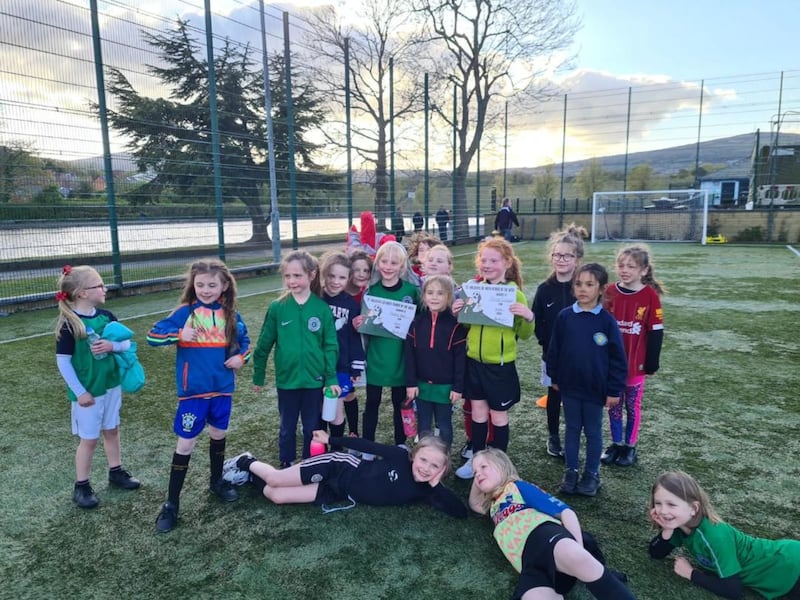OVER the past week I would love to have been able to lift the phone to John Morrison. I would have picked his brains about how to go about coaching six, seven and eight-year-old girls.
‘Beefer’ would have the answers for me. That’s what John Morrison did. He problem-solved.
He would think laterally and be able to position you in such a way that gave you a clearer view of things.
Anyone who encountered John Morrison in their life would agree that he nourished the soul as much as anything else.
At our club, if you need help with session-building, equipment, gear, venue space, it’s all there.
You’re enrolled for coaching and mental health awareness courses. The support coaches get is second to none.
But there’s no coaching manual at any club that teaches you people skills.
Of course, there are guiding principles in books and online for situations that may arise - but nobody with the instinct or intuition and deep charisma of John.
His people skills were innate and there was nobody better than imparting them.
It was John who first coined the phrase to me: “Players don’t care what you know, until they know that you care.”
Session building was one thing; getting the best out of a player was something entirely different.
One of my favourite interviews over the last number of years was with Patrick Morrison, former Armagh goalkeeper and John’s son.
Patrick is a chip off the old block.
We sat in a café in Camlough one Saturday afternoon for a couple of hours last year and talked about life, the art of goalkeeping, football and the rich legacy his father left.
When we met it was approaching John’s first anniversary.
He regaled me with one of his father’s parables about the 'Sculptor' and how he turned a piece of stone into a work of art.
When people praised his work, the sculptor would say: ‘I didn’t do it at all – I just brushed away the hard edges.’
“The game is there,” Patrick said. “We’re just brushing off the rough edges. That’s the way I see it. And that’s listening to my Da for so long!”
Amid the clatter of tea-cups and steaming coffee machines and general chat in the packed café, Patrick described grief in his own unique terms.
He took a notepad and pen and drew two squares beside one another. Both squares were rooms, he explained, and he drew a button in each room.
In the first square, he drew a large circle, and in the second square he drew a much smaller circle.
“[Looking at his notepad] You’ve a room with a massive pain button and a big ball in the room and no matter where the ball is moving it’s always hitting the button.
“As time passes, the ball gets smaller, bounces around the room and doesn’t hit the button as much but when it does hit the button the pain is still the same, but it just hits the button less.”
Like his old man, Patrick is a deep thinker about the game. He pops up on Twitter very occasionally and is always worth reading.
The debate was started by Antrim footballer Patrick McBride a few weeks ago. He posed the question: Should children aged 6-12 be given a certificate for participation on sports day or should there be winner’s medals (gold, silver, bronze)?
Twitter is becoming more vacuous and irrelevant as time passes but McBride’s question prompted so much rich debate and conversation.
Opinion was divided.
Some believed you had to nurture a love of the game first among children before introducing winner’s medals.
Others insisted that children needed to be more resilient from an early age and that losing was part of the growing process.
Patrick Morrison entered the Twitter debate and, typically, took the conversation to a different plain.
He wrote: “An anthropologist proposed a game to kids in an African tribe. He put a basket of fruit near a tree and told the children whoever got there first won the sweet fruits.
“When he told them to run they all took each other’s hands and ran together, then sat together enjoying their treats.
“When he asked them why they had run together like that as one could have had all the fruits for himself they said: ‘Ubuntu, how can one of us be happy if all the other ones are sad?’”
Our wee team lost by four goals last weekend. It was a chastening experience for the kids.
I'd like to think they learned more in defeat than the previous week when they strolled to victory and scored lots of goals against weaker opposition.
For a while I thought of the flaws in the team and where we could improve and, more importantly, where I could improve.
And then you realise they're seven and eight-years-old. Just kids. Fantastic kids too.
Emerging into the light from a grievous pandemic.
All they want to do is enjoy each other's company and if they score a goal or make a tackle or make a pass they're happy.
They can go home and in their own wee worlds they can bask in their best moments.
Before last night's training session I was thinking of working on their positional awareness.
Then I thought: What would 'Beefer' do?
I'd imagine he'd say: 'Let them have fun. Do something completely different.'
If John was alive today I would have had him up taking the session and I'd watch and learn.
As for the room, the ball and the pain button Patrick was telling me about last year, I hope the ball is much smaller and is not hitting the button as much as it used to.
I'm with Ubuntu. Always.









